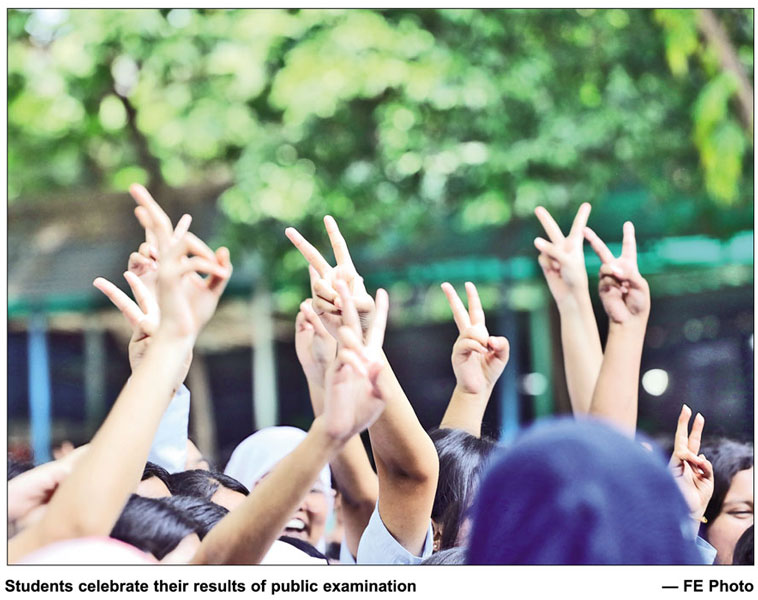
Published :
Updated :


Bangladesh recently witnessed a powerful student-led uprising initially aimed at addressing unfair job quotas in the public sector. This movement, which ultimately contributed to the ouster of a government, has highlighted core issues relating to governance, education, and job creation that particularly affect the country’s youth. The initial focus on job quotas revealed underlying frustrations with an outdated education system, a public sector prioritising political connections over qualifications, and limited opportunities for meaningful employment. With the current interim government in power, addressing these core issues now presents an opportunity to build a foundation for creation of institutions that prioritise meritocracy, fairness, and a future-focused education system.
The need for institutional reform in Bangladesh
While Bangladesh has experienced significant economic growth over the past three decades, youth unemployment, especially among university graduates, remains high. Official estimates suggest a youth unemployment rate staying above 10 per cent, with some studies indicating that as many as 29 per cent of graduates struggle to find jobs that match their qualifications. This disconnect between economic growth and job creation points to institutional weaknesses, including an education system misaligned with market demands and a public sector that often rewards loyalty over merit. Bangladesh must implement institutional reforms aimed at creating a merit-based public sector, a dynamic education system, and a job market that rewards innovation and fosters opportunities for young people.
Building a modern education system
The foundation of any prosperous society is a strong education system that prepares its citizens for the demands of the modern workforce. Bangladesh’s education system, however, is plagued by outdated curricula, note learning, and political interference. As a result, many graduates enter the job market without the skills needed to succeed in a competitive global economy. The recent student uprising highlights the urgency of reforming the education system to address these challenges and better serve the country’s youth.
Bangladesh can look to countries like India and Vietnam, which have made significant strides toward reforming their education systems aligned with job market needs. India, for instance, has invested heavily in technical education, research, and innovation, creating a pool of skilled professionals who attract global investments in technology and science. The Indian Institutes of Technology (IITs) and Indian Institutes of Management (IIMs) are examples of institutions that have successfully produced world-class graduates who contribute to the country’s economic growth. Vietnam, meanwhile, has expanded its higher education sector and introduced vocational training programmes that equip students with the skills needed in industries like manufacturing and information technology. These reforms have not only prepared graduates for diverse industries but have also fostered job creation and economic growth. Key steps for reform include:
Curricula Alignment with Job Market Needs: Universities and technical colleges should collaborate with industry leaders to ensure that graduates have skills relevant to high-demand fields, such as technology, engineering, and health sciences.
Promotion of Critical Thinking and Innovation: Moving beyond note learning to foster problem-solving skills and creativity can be achieved through project-based learning, internships, and hands-on experiences that encourage students to apply knowledge practically.
Teacher Training Investment: Building a quality education system requires well-trained teachers who are knowledgeable in modern pedagogical methods. Bangladesh should prioritise training programmes that focus on digital literacy, innovative teaching strategies, and subject expertise.
Establishment of Research and Innovation Hubs: Universities should create dedicated research centres in fields like engineering and science, facilitating collaboration with industries and encouraging innovation that contributes to a knowledge-driven economy.

Establishing a Merit-Based Public Service
The student-led movement underscored the need for a public service system where appointments are made based on merit rather than political connections. Building a meritocratic public sector will improve public trust and enable talented individuals to contribute meaningfully to national development. Vietnam’s public sector reforms demonstrate the value of prioritising talent and accountability, which has improved the quality of its institutions.Key reforms for a merit-based public service include:
Transparent Recruitment Processes: Public sector jobs should be awarded based on qualifications, skills, and potential rather than connections. Civil service exams and recruitment panels should operate without political influence to ensure fair hiring practices.
Performance-Based Promotions: Public sector employees should be promoted based on performance evaluations that reward contributions and support professional growth, fostering a culture of excellence.
Building Accountability: Accountability mechanisms, such as regular audits and citizen feedback channels, are essential for maintaining a public sector that serves the population effectively and responsibly.
Creating Gender-Inclusive Institutions
One of the most remarkable aspects of the 2024 uprising was the active participation of female students, who played a prominent role in leading protests and advocating changes. This moment highlights the potential for Bangladesh to create gender-inclusive institutions that support women’s participation in education, employment, and public life.
Bangladesh has made significant progress in promoting gender equality, with initiatives like free primary education and stipends for female students boosting female literacy rates. Today, women make up a substantial proportion of university students, and they have a good share in the workforce, particularly in the ready-made garment (RMG) sector, where they account for over 80 per cent of the labour force. However, opportunities for women remain limited to certain sectors, and broader systemic change is needed to ensure gender equality in all areas of life. To foster gender inclusion, Bangladesh should focus on:
Encouraging Girls in Higher Education: While girls’ enrolment in primary and secondary education is high, there is a need to increase girls’ participation in fields like STEM. Scholarships, mentorship programmes, and awareness campaigns can help break down barriers and inspire young women to pursue diverse career paths.
Safe Learning Environments: Schools and universities should enforce policies that protect girl students from harassment and violence, creating an environment where they can learn without fear.
Gender Equality in the Workplace: Promoting policies such as equal pay, flexible work options, and career advancement opportunities can encourage more women to enter and remain in the workforce.
Addressing Gender-Based Violence: Programmes that raise awareness about gender-based violence and provide support services for survivors can reduce one of the significant barriers to women’s education and employment.
Fostering Innovation and Job Creation
The student uprising highlighted the disconnect between economic growth and job creation in Bangladesh. While the economy has grown rapidly, quality jobs have not kept pace with the number of university graduates entering the workforce. To address this challenge, Bangladesh needs to create an economy that fosters innovation, attracts investments, and creates sustainable jobs.
One way to achieve this is by developing sectors like science, engineering, and technology, which have the potential to create high-paying jobs and drive economic growth. Bangladesh can learn from countries like India, which has attracted global technology companies by investing in research and development and creating a business-friendly environment. India’s success in the technology sector has created jobs, spurred innovation, and positioned the country as a leader in the global economy. Strategies to foster innovation and job creation include:
Attracting Investments in High-Value Sectors: Bangladesh should create a business-friendly environment to attract investments in sectors like technology, pharmaceuticals, and renewable energy, which offer high-paying jobs and sustainable growth.
Supporting Start-ups and Small Businesses: Policies that support entrepreneurship through financing, business incubators, and mentorship programmes can drive job creation and cultivate a culture of innovation.
Developing a Skilled Workforce: Investing in vocational and technical training can help prepare workers for high-demand sectors, providing them with the skills necessary to thrive in a modern economy.
Charting a Path Forward
The recent student movement reflects a clarion call for justice, opportunity, and systemic change. By reforming education, creating a merit-based public service, and fostering gender-inclusive institutions, Bangladesh can address the aspirations of its youth and lay the foundation for a prosperous future. This path forward requires significant reforms in education, employment, and governance, but with concerted efforts, Bangladesh can seize this moment to create a society that values talent, encourages innovation, and provides opportunities for all its citizens.
By embracing these reforms, Bangladesh has the potential to transform its institutions and ensure inclusive growth, transparency, and build a nation that values the contributions of its youth and women. Through these changes, Bangladesh can shape a future that is equitable, prosperous, and capable of meeting the aspirations of its people.
Dr Asad Islam is Professor of Economics and Director at Centre for Development Economics and Sustainability (CDES), Monash University, Australia.
asadul.islam@monash.edu


 For all latest news, follow The Financial Express Google News channel.
For all latest news, follow The Financial Express Google News channel.